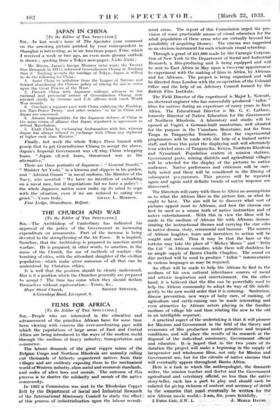FILMS FOR AFRICA •
[To the Editor of THE SPECTATOR.] Sm,—People who are interested in the education and advancement of the primitive African have for some time been viewing with concern the ever-accelerating pace with which the populations of large areas of East and Central Africa are being introduced to the ways of the modern world through the medium of heavy industry, transportation and commerce.
The labour demands of the great copper mines of the Belgian Congo and Northern Rhodesia are ammaLy calling out thousands of hitherto sequestered natives from their villages and are suddenly exposing them to the mechanized world of Western industry, alien social and economic standards, and codes of alien laws and morals. The outcome of this process is to shatter the solidarity and morale of the native community.
In 1932 a Commission was sent to the Rhodesian Copper Belt by the Department of Social and Industrial Research of the International Missionary Council to study the effect of this process of industrialization upon the labour recruit-
ment areas. The report of this Commission urged the pro- vision of some practicable means of visual education for the adult population of these areas who are virtually beyond the possibility of acquiring literacy. The cinema was suggested as an obvious instrument for such wholesale visual schooling.
Through a grant of £11,000 made by the Carnegie Corpora- tion of New York to the Department of Social and Industrial Research, a film-producing unit is being equipped and will be sent to East Africa in May upon a two-year appointment to experiment with the making of films in Africa, by Africans and for Africans. The project is being organized and will be directed from London with the co-operation of the Colonial Office and the help of an Advisory Council formed by the British Film Institute.
The Field Director of the experiment is Major L. Noteutt, an electrical engineer who has successfully produced " talkie " films for natives during an experience of many years in East Africa. The Educational Director is Mr. G. C. Latham, formerly Director of Native Education for the Government of Northern Rhodesia. A laboratory and studio will be opened at Vugiri, a German-built sanatorium, well situated for the purpose in the Usambara Mountains, not far from Tanga in Tanganyika Territory. Here the experimental programmes will be made with the help of a trained native staff, and from this point the displaying unit will alternately tour selected areas of Tanganyika, Kenya, Northern Rhodesia and Nyasaland. Population centres at mission stations, Government posts, mining districts and agricultural villages will be selected for the display of the pictures to native audiences. Native preferences and criticisms will be care- fully noted and these will be considered in the filming of subsequent pro Irammes. This process will be repeated again and again until definite trends of native response are discovered.
The Directors will carry with them to Africa no assumptions as to what the African likes in the picture line, or what he ought to have. The aim will be to discover what sort of pictures appeal most to Africans, and how the cinema can best be used as a means both of native instruction and of native entertainment. With this in view the films will be made in the medium of African life with Africans demon- strating the instructional themes and carrying the star roles in native drama, story, ceremonial and humour. The sources of African laughter, tears and incentives to action will be sought and used. Thus it may be that the hare or the tortoise may take the place of " Mickey Mouse " and " Felix the Cat " in African comedies, while there will doubtless be an ample supply of Bantu Charlie Chaplins. The sound On disc method will be used to produce " talkie " commentaries in various languages as may be required.
An effort will be made to help the African to fmd in the medium of his own cultural inheritance sources of racial and artistic inspiration and entertainment. On the other hand, it is believed that the film can be powerfully used to help the African community to adapt its way of life intelli- gently to the new world order that it is entering. Sanitation, disease prevention, new ways of baby care, of cooking, of agriculture and cattle-raising can be made interesting and even attractive by African actors playing in the familiar medium of village life and thus relating the new to the old in an intelligible sequence.
A practical aspect of the undertaking is that it will pioneer for Missions and Government in the field of the theory and economics of film production under primitive and tropical conditions, and will place the results of its research at the disposal of the individual missionary, Government official
and educator.-, 41:is ,poped • that the two years of its duration the project will make a beginning in the supply of inexpensive and wholesome films, not only for Mission and Government use,- but for the circuits of native cinemas that will eventually appear throughout. Bantu Africa.
Here is a task in which the anthropologist, the dramatic writer, the mission teacher and doctor and the Government agricultural and veterinary official, no less than the native story-teller, each has a part to play and should each be enlisted for giving richness of content and accuracy of detail to the scenarios that must eventually be written for the new African movie world.z.--I am, Sir, yours faithfully,




























































 Previous page
Previous page